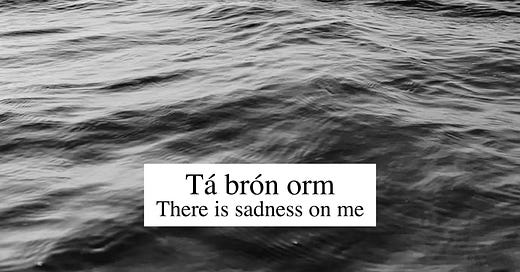There are times when I’ve explained aspects of the languages I’m learning to people who don’t speak them and they shake their heads in disbelief.
“That’s so complicated.”
“How can you remember that?”
“That makes no sense.”
Usually, the problem isn’t the language in question but rather how different it is than the languages these people are familiar with.
However, I noticed something really interesting happened when I shared one of the unique features of Irish here on Substack.
I posted a Note (think Twitter/Threads but built into Substack) a few months ago. It is still getting comments, likes and shares on a daily basis.
The note in question…
At first, I understood why there was such a strong reaction to it. Those of us who have spent a while in the Irish language community know that’s a popular fact to share for good reason.
However, as time went on, I began to wonder why this didn’t fall into the “that’s nothing like English and it must be so confusing to speak like that” category of phrases.
I realized, it’s because emotion is universal.
We all understand emotion. We all place value on emotion.
The value makes it worth the effort to understand.
It’s easy to feel overwhelmed and afraid of aspects of a language that are so different from our own. They go against our internal logic and how we see the world, which makes the matter of learning them more challenging than simply remembering new words or grammar. We have to process the world in a new way. However, when we immediately see value and beauty in those aspects, we want to understand them. We’re willing to learn. We’re willing to put in the work because we understand it’s worth th effort.
It’s easy to dismiss things we don’t understand, but if we can take the time to understand the value they hold, we’d all be more willing to put in the effort to learn.
If you enjoyed this article, subscribe for more reflections on language, learning, and how those experiences shape how we see the world.
More from Foghlaimeoir:
Irish translation of this article
Five Years Learning






I love this reflection, there's so much to mine regarding the relationship to emotions and feelings. I love 'Ta ocras an domhain orm' (can't find fadas on my phone). The hunger of the world is upon me. Couldn't get any more emphatic really 🌍😁
Not just emotions: illnesses and names. Maybe the recognition that we are all subject to external influences and bound up in systems outside our control doesn't chime easily with speakers of imperial languages, such as English or Spanish, where the assumption of heroic individual autonomy is part of the Zeitgeist. (Long press on phone keys usually reveals a series of options with diacritics.)